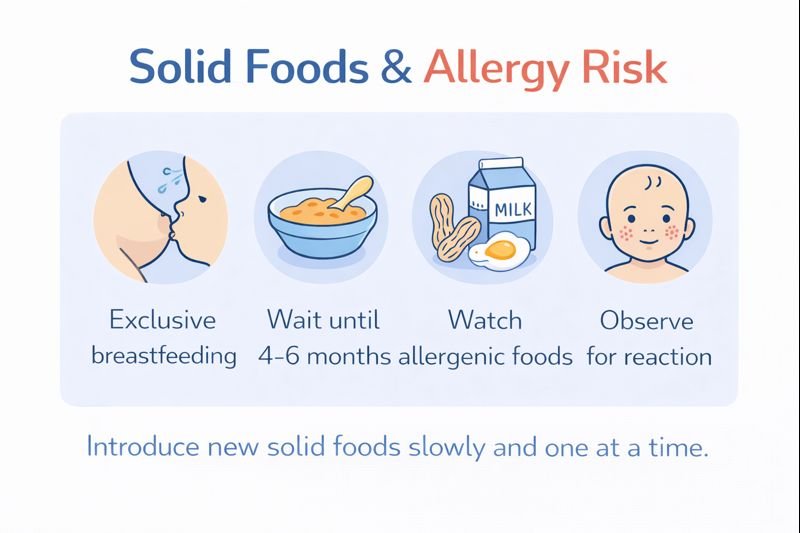Introducing Solid Foods and Allergy Risk: What Parents and Caregivers Should Know
Understanding food allergies in infants
Food allergies are increasingly common, and many parents and caregivers are understandably concerned about how and when solid foods should be introduced—especially for infants with a family history of allergies. Introducing solids is an important developmental milestone, but timing, food choice, and observation all play a role in supporting infant health.
From a public health and first aid awareness perspective, understanding early allergy risk helps caregivers recognize reactions early and make informed feeding decisions.
Why this topic matters for Canadian families and caregivers

-
Childcare and early learning environments
-
Parenting programs and public health education
-
First aid and allergy-awareness training
Knowing how food allergies may develop helps caregivers watch for early signs of reactions and understand when medical assessment may be needed.
Scenario: Introducing solids thoughtfully
A parent with a family history of allergies began introducing solid foods to their infant gradually. They started with single-ingredient foods and waited several days between new items. When mild skin irritation appeared after one food, they paused introductions and discussed the reaction with a healthcare professional. The careful approach helped identify possible sensitivities early.
What research suggests about timing and allergy risk
Research has explored whether early or delayed introduction of solid foods influences allergy development. Findings have varied over time, which is why guidance has evolved.
Key observations from studies include:
-
Introducing solid foods before 4 months of age has been associated with higher rates of certain allergic conditions, such as eczema
-
Very early introduction (under 2 months) has been linked with breathing and feeding difficulties in infancy
-
Exclusive breastfeeding for the first several months of life has been associated with lower rates of some allergic conditions during childhood
Overall, many studies suggest that introducing solids too early may increase risk, while overly delaying foods may also have downsides.
Introducing solid foods gradually
When solid foods are introduced:
-
Single-ingredient foods are often offered one at a time
-
New foods are usually spaced over several days
-
This approach allows caregivers to observe for reactions, such as rashes, vomiting, swelling, or breathing changes
This method supports early recognition of food sensitivities and helps caregivers respond appropriately.
Foods and allergy considerations
Certain foods are more commonly associated with allergic reactions, especially in early childhood. These may include:
-
Cow’s milk and dairy products
-
Eggs
-
Peanuts and tree nuts
-
Fish and shellfish
Some fruits and vegetables can also cause reactions in young children, particularly when introduced early.
Food choice should consider:
-
Nutritional value
-
Texture and choking risk
-
Family history of allergies
Timing and evolving guidance
Older guidance often recommended delaying allergenic foods until later childhood, particularly for children with a family history of allergies. However, more recent evidence suggests there is limited benefit to delaying many foods beyond the typical solid-food introduction window.
Current public health guidance emphasizes:
-
Avoiding solid foods before developmental readiness
-
Introducing a variety of nutritious foods when appropriate
-
Monitoring closely for reactions
-
Avoiding unnecessary dietary restriction that could affect nutrition and growth
Because guidance continues to evolve, individualized advice is often recommended.
First aid and allergy awareness
From a first aid education standpoint:
-
Caregivers should be aware of early signs of allergic reactions
-
Feeding should be supervised, especially with new foods
-
Any concerning reaction should prompt medical assessment
Early recognition is key to reducing risk and supporting safe feeding practices.
Frequently Asked Questions
Does delaying solid foods prevent allergies?
Research suggests that delaying solids beyond the typical introduction period does not reliably prevent allergies and may limit nutrition.
Can breastfeeding reduce allergy risk?
Breastfeeding has been associated with a lower risk of some allergic conditions, though it does not eliminate risk entirely.
Why introduce one food at a time?
Spacing foods helps caregivers identify which item may be responsible if a reaction occurs.
Are all infants at equal risk for food allergies?
No. Family history and existing allergic conditions can increase risk.
Should high-allergen foods always be avoided early?
Guidance varies, and decisions are best made with informed medical input based on the child’s individual risk.
Educational note
This article is intended for general health and first aid education. Infant feeding and allergy risk vary between individuals, and caregivers should seek guidance from qualified healthcare professionals for personalized nutrition and allergy concerns.
